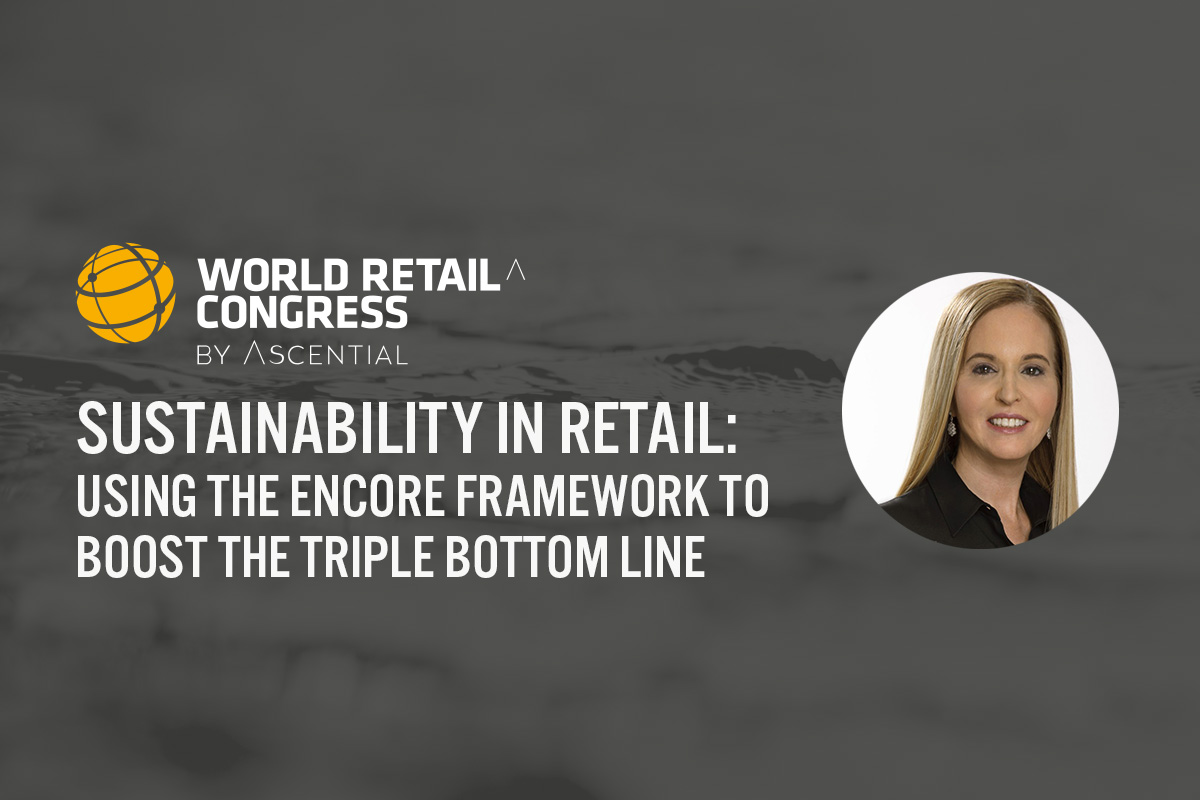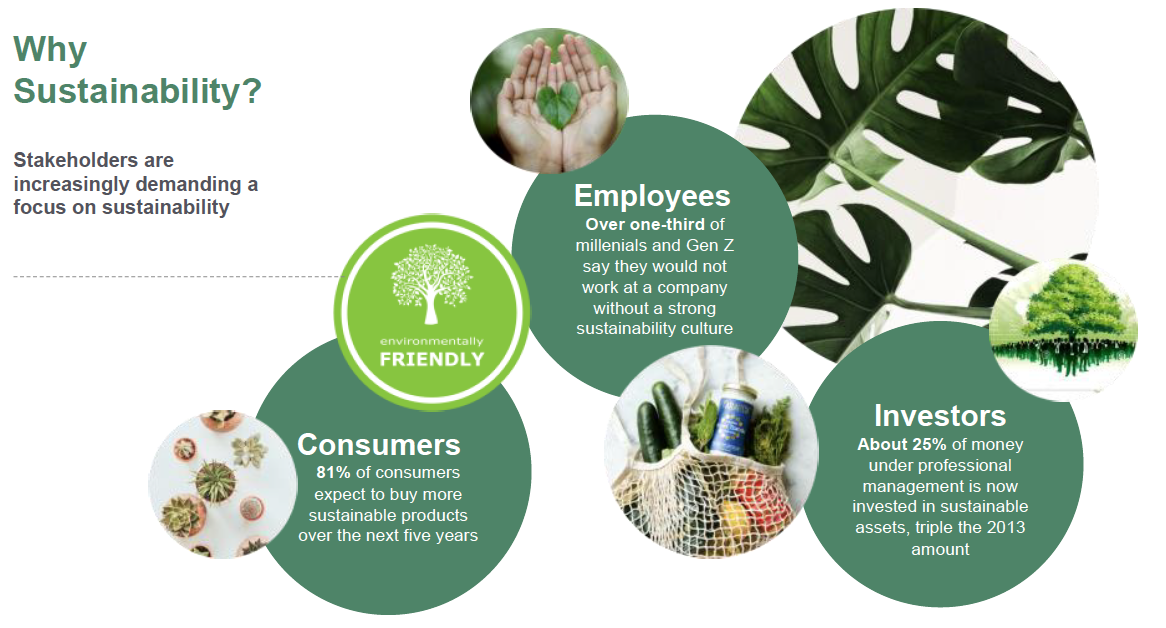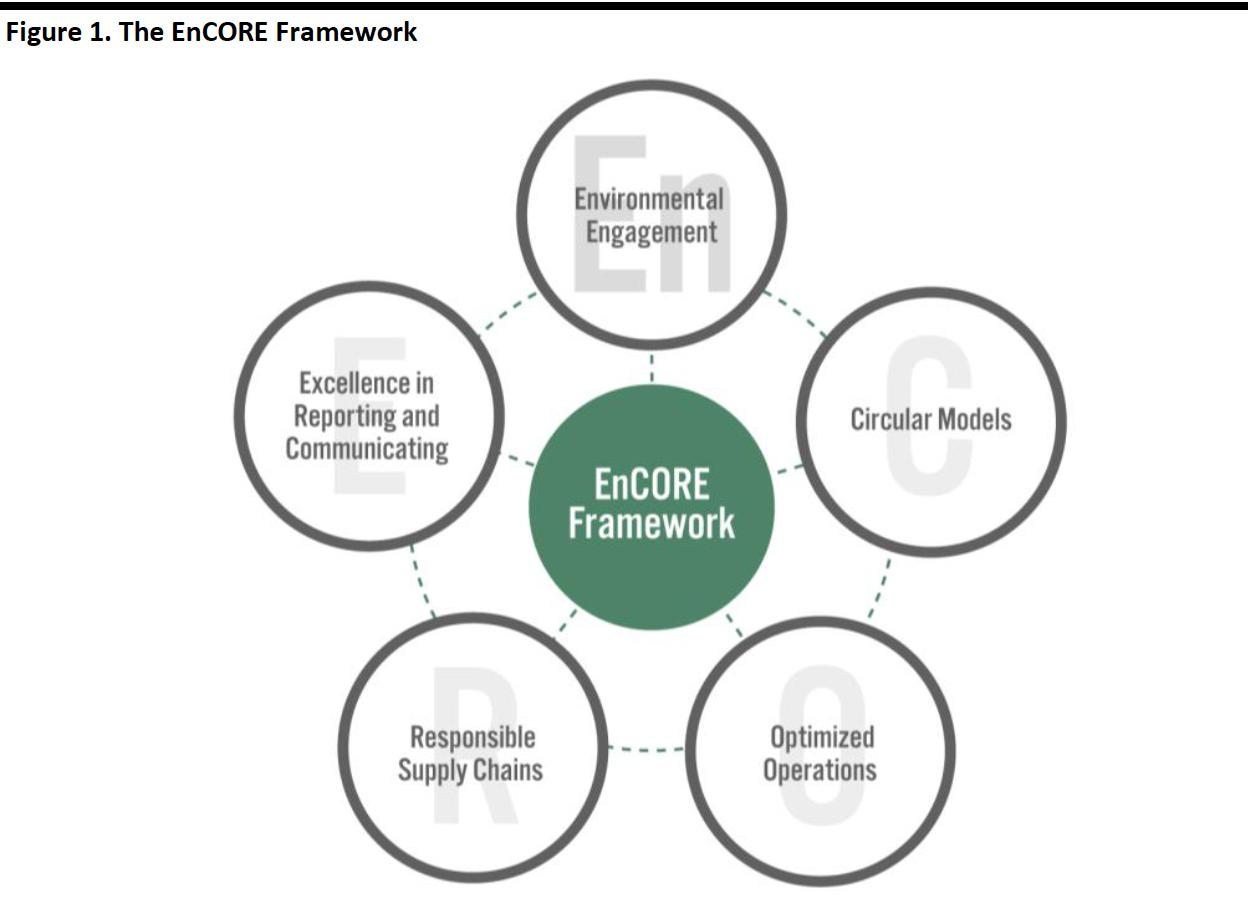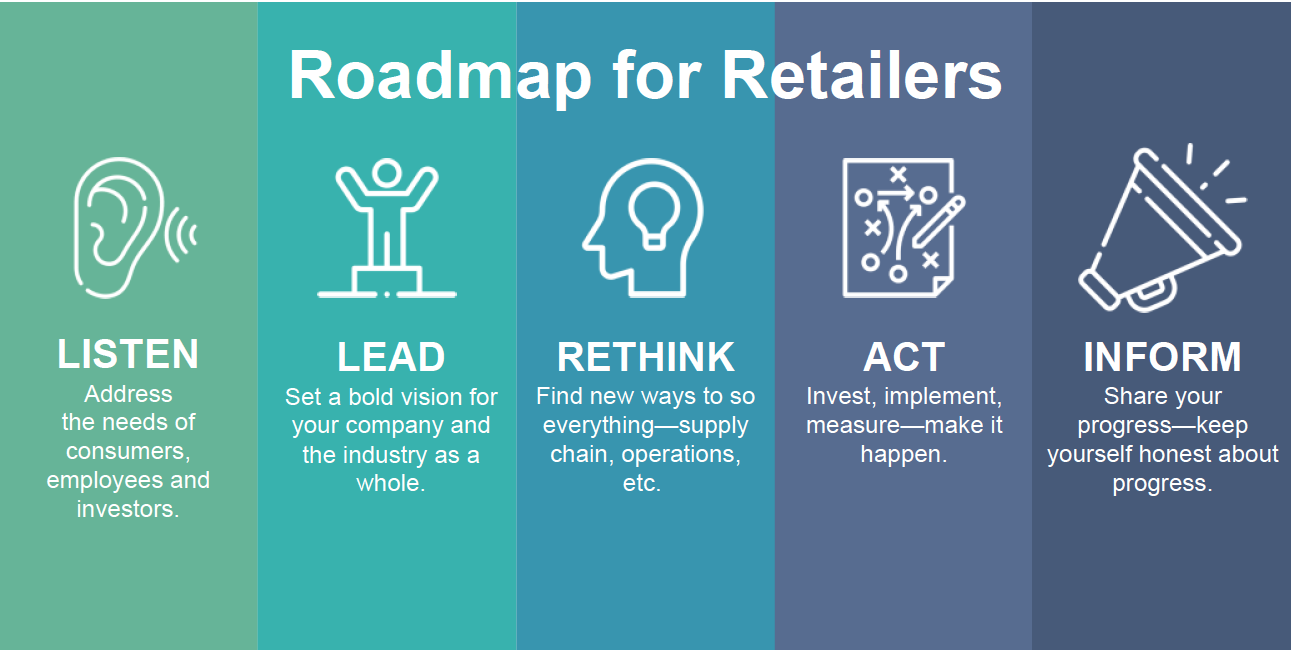
albert Chan
Deborah Weinswig, CEO and Founder of Coresight Research, presented to the World Retail Congress on September 16, 2020 about sustainability in retail. We provide key insights from the event, outlining how the five elements of Coresight Research’s EnCORE framework can help retailers to boost the triple bottom line of people, the planet and profits.
Understanding Sustainability in Retail
Coresight Research has heightened its focus on sustainability since 2019, when Weinswig was involved in eye-opening discussions around the topic with global supply chain think tank Li & Fung and US retailer T.J. Maxx, which were implementing creative strategies to promote sustainability. Now that Covid-19 has dramatically altered the retail landscape, Coresight Research is working to reassess the sustainability landscape as retailers look for opportunities to optimize operations and reduce costs through eco-friendly initiatives.
During her presentation to the World Retail Congress, Weinswig emphasized the importance of retailers taking the lead on sustainability by creating environmentally conscious operations and supply chains. With their sprawling supply chains and vast fulfillment infrastructure, retailers are in a unique position to make meaningful progress towards a sustainable economy.
Why Sustainability? Why Now?
In the midst of a pandemic, sustainability may seem like a low priority to many in the retail world. Sustainability initiatives have a reputation for being costly, very long term and of little concern to important stakeholders. However, the topic has come to the fore in the past two years, with all three groups of stakeholders—consumers, employees and investors—becoming increasingly concerned about sustainability.
According to a 2019 Accenture survey of North American, European and Asian consumers, 81% of consumers expect to buy more sustainable products over the next five years. Millennials and Gen Z consumers are particularly focused on sustainability, with more than one-third of this demographic in the US saying that they would not work at a company that does not have a strong sustainability culture, according to a 2019 survey conducted by swytchX, a sustainability-focused digital assets company. Similarly, investors have also placed an increased emphasis on sustainability recently: About 25% of money under professional management is now invested in sustainable assets—triple the proportion from 2013—according to a report published by the US SIF Foundation.
The Covid-19 pandemic has contributed significantly to the recent paradigm shift, strengthening stakeholders’ attitudes to the importance of sustainability. In a Coresight Research September survey of US consumers, 29% of respondents said that the crisis has made sustainability more of a factor for them when shopping, compared to just 16% that stated it had become less of a concern. Of those who reported a heightened focus on sustainability, 55% said it stemmed from pandemic-driven reflections on what is most important, while 45% said that their changed behavior was caused by a realization during lockdown of how immediately changed human behavior can affect the planet—for example, by increasing air quality.
Just as the pandemic has caused consumers to reflect on their behavior, it has also forced retailers to rethink their operations and supply chains, often with cost reduction and resilience being priorities. The rapid shift toward an e-commerce-focused retail model has forced many retailers to reevaluate their fulfillment models, while coronavirus-related restrictions on international trade have created unprecedented difficulties throughout the supply chain globally. In the midst of this reevaluation of operational models, sustainable solutions may prove not just responsible but profitable as well.
[caption id="attachment_118164" align="aligncenter" width="700"] All stakeholders are placing a strong emphasis on sustainability
All stakeholders are placing a strong emphasis on sustainabilitySource: Accenture/Cone Communications/US SIF Foundation/Coresight Research[/caption]
Using the EnCORE Framework to Benefit the Triple Bottom Line: People, Planet and Profits
Coresight Research developed the EnCORE framework to help retailers and brands frame their approach to sustainability. The framework comprises five components (see Figure 1), providing a model through which retailers can begin to internalize a sustainability strategy. In her presentation, Weinswig focused on how retailers can leverage the framework to boost profits and drive growth while realizing environmental benefits.
[caption id="attachment_118165" align="aligncenter" width="700"] Source: Coresight Research[/caption]
Source: Coresight Research[/caption]
Environmental Engagement
Sustainability is not something to which retailers can dedicate one, isolated department and continue running the rest of the business as usual. In order for any sustainability effort to be successful, it must be woven into the fabric of the entire organization. Weinswig advised retailers to set a bold vision for their companies to lead sustainability efforts, and to approach all aspects of the business with one eye on sustainability. This includes working with customers, suppliers and partners to craft a comprehensive sustainability campaign.
Some brands and retailers have already embraced collaboration as a powerful tool in their march towards sustainability:
- Adidas has partnered with nongovernmental organization Parley for the Oceans and retailer Stella McCartney to introduce sustainable products and host fundraising events to help fight climate change.
- Walmart has worked with suppliers to cut 230 million tons of emissions over the past three years, and aims to help its suppliers cut 1 billion tons of emissions by 2030.
Weinswig views collaboration, engagement and ambition as three key components of a successful sustainability strategy.
Circular Models
Weinswig advised retailers to rethink their supply chains, transitioning towards circular models powered by recycling, resale and reusable materials. She touted the success of fashion resale platform ThredUP during the pandemic as a sign that the reuse and resell market has weathered the pandemic well, and that it should continue to grow. The company maintained 20% year-over-year revenue growth during the height of the pandemic (mid-March to May 31).
Beyond rental and resale, garment recycling companies such as G2G, a Hong Kong-based company, uses energy-efficient technologies to transform used garments into usable materials for apparel manufacturing. IBM has also developed the VolCat recycling system, which removes contaminants from previously difficult-to-recycle plastics and reuses them to create new materials.
[caption id="attachment_118166" align="aligncenter" width="700"] Weinswig advocated for retailers to invest in circular production models
Weinswig advocated for retailers to invest in circular production modelsSource: Coresight Research[/caption]
Optimized Operations
Weinswig highlighted how retailers can optimize their operations in a way that reduces their environmental impact while also reducing costs and appealing to an increasingly environmentally conscious consumer base. Increasing the energy efficiency of stores and data centers can make a substantial difference in sustainability efforts.
Alibaba, China’s largest e-commerce retailer, has taken steps to reduce the energy consumed to power its vast data centers. The company now powers its Zhangbei data center with 100% renewable energy, which, in addition to reducing the use of fossil fuels, reduces the overall costs of power for the facility. Renewable energy sources generate less heat, enabling Alibaba to use less air conditioning in its facilities to keep servers cool. The same principle can apply to stores, where retailers can take simple steps such as switching to energy-efficient light bulbs and relying more on skylights.
Responsible Supply Chains
Environmentally responsible supply chains in many instances correlate closely with cost-efficient supply chains. Demand-driven supply chains utilize real-time sales data and machine learning to predict consumer behavior, enabling retailers to reduce excess inventory and optimize production.
Inspectorio is one retail-tech startup that retailers can partner with to promote sustainability by using predictive intelligence to limit the amount of inventory that goes to waste. Digital designing, enabled by 3D rendering and fit technology, can also enable retailers to design products digitally and hold virtual fashion shows, thus reducing production costs and travel.
Excellence in Reporting and Communication
In closing out the EnCORE framework, Weinswig highlighted the importance of internal accountability and external transparency when approaching sustainability. In 2019, 90% of companies in the S&P 500 Index published sustainability reports, indicating a broad focus on sustainability transparency even beyond the retail industry.
In order to boost accountability, Microsoft and Kering have both developed sustainability calculators that retailers can use to track their progress. Kering’s Environmental Profit and Loss calculator, which the company has shared with other companies in the industry, tracks a company’s environmental impact in all of its operations. Similarly, Microsoft’s sustainability calculator provides real-time and predictive emissions data, enabling companies to take immediate action to reduce their environmental impact, and improving internal reporting, communication and accountability.
Roadmap for Retailers
Weinswig cautioned that sustainability initiatives have no finite ending—by their very nature, these efforts must be ongoing to be effective. Despite their long lifespans, sustainability efforts can have immediate positive impacts on the triple bottom line of people, the planet and profits. Sustainable companies can attract a greater pool of employees and customers, all while potentially reducing their operational and production costs. Becoming sustainable may seem a daunting task, but all retailers have the ability to begin integrating environmental factors into decision-making across their business.
[caption id="attachment_118167" align="aligncenter" width="700"] Weinswig closed the presentation with this roadmap for retailers
Weinswig closed the presentation with this roadmap for retailersSource: Coresight Research[/caption]